2010年中考英语直接引语和间接引语专题指导练习3
2010年中考英语直接引语和间接引语专题指导练习4
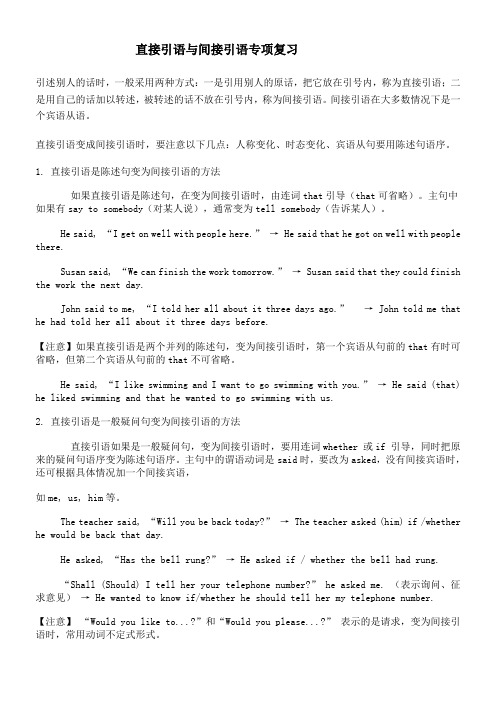
直接引语与间接引语专项复习引述别人的话时,一般采用两种方式:一是引用别人的原话,把它放在引号内,称为直接引语;二是用自己的话加以转述,被转述的话不放在引号内,称为间接引语。
间接引语在大多数情况下是一个宾语从语。
直接引语变成间接引语时,要注意以下几点:人称变化、时态变化、宾语从句要用陈述句语序。
1. 直接引语是陈述句变为间接引语的方法如果直接引语是陈述句,在变为间接引语时,由连词that引导(that可省略)。
主句中如果有say to somebody(对某人说),通常变为tell somebody(告诉某人)。
He said, “I get on well with people here.”→ He said that he got on well with people there.Susan said, “We can finish the work tomorrow.”→ Susan said that they could finish the work the next day.John said to me, “I told her all about it three days ago.”→ John told me that he had told her all about it three days before.【注意】如果直接引语是两个并列的陈述句,变为间接引语时,第一个宾语从句前的that有时可省略,但第二个宾语从句前的that不可省略。
He said, “I like swimming and I want to go swimming with you.”→ He said (that) he liked swimming and that he wanted to go swimming with us.2. 直接引语是一般疑问句变为间接引语的方法直接引语如果是一般疑问句,变为间接引语时,要用连词whether 或if 引导,同时把原来的疑问句语序变为陈述句语序。
中考英语直接引语和间接引语专题指导练习3
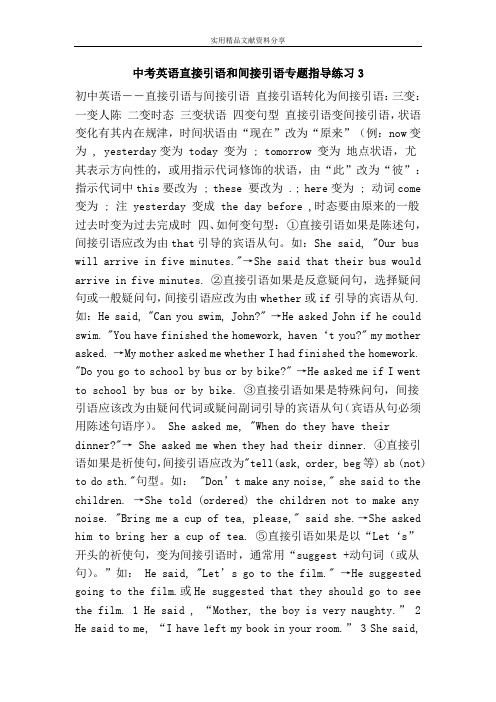
中考英语直接引语和间接引语专题指导练习3初中英语――直接引语与间接引语直接引语转化为间接引语:三变:一变人陈二变时态三变状语四变句型直接引语变间接引语,状语变化有其内在规津,时间状语由“现在”改为“原来”(例:now变为 , yesterday变为 today 变为 ; tomorrow 变为地点状语,尤其表示方向性的,或用指示代词修饰的状语,由“此”改为“彼”:指示代词中this要改为 ; these 要改为 .; here变为 ; 动词come 变为 ; 注 yesterday 变成 the day before ,时态要由原来的一般过去时变为过去完成时四、如何变句型:①直接引语如果是陈述句,间接引语应改为由that引导的宾语从句。
如:She said, "Our bus will arrive in five minutes."→She said that their bus would arrive in five minutes. ②直接引语如果是反意疑问句,选择疑问句或一般疑问句,间接引语应改为由whether或if引导的宾语从句.如:He said, "Can you swim, John?" →He asked Joh n if he could swim. "You have finished the homework, haven‘t you?" my mother asked. →My mother asked me whether I had finished the homework. "Do you go to school by bus or by bike?" →He asked me if I went to school by bus or by bike. ③直接引语如果是特殊问句,间接引语应该改为由疑问代词或疑问副词引导的宾语从句(宾语从句必须用陈述句语序)。
中考专题之直接引语和间接引语讲解+练习题-最新教学文档

中考专题之直接引语和间接引语练习题一、将所给直接引语变为间接引语,每空一词1. “I never eat meat.” he said.He said that ______ never ______ meat.2. “I’ve found my wallet.” he said to me.He _____ me that he ______ ______ ______ wallet.3. “I took it home with me.” she said.She said that ______ ______ _______ it home with her.4. The teacher said, “The sun rises in the east and goes down in the west.”The teacher said that the sun ______ in the east and ______ down in the west.5. “I met her yesterday.” he said to me.He ______ me that he ______ met her the day ______.6. “You must come here before five.” he said.He said that I ______ to go ______ before five.7. “I bought the house 10 years ago.” he said.He said that he _______ bought the house 10 years _______.8. “Did you see her last week?” he s aid.He ______ ______ I had seen her the week _______.9. He said, “You can sit here, Jim.”He ______ Jim that he ______ sit there.10. H e asked, “How did you find it, mother?”He asked his mother ______ ______ ______ found it.11. “Where have you been these days?” he asked.He asked me _______ _______ _______been _______ days.12. “Do you know where she lives?” he asked.He asked ______ ______ knew where she ______.13. “Stop making so much noise, children.” he said.He ______ the children ______ ______ making so much noise.14. “Don’t tell him the news.” she said.She told me _______ ______ ______ him the news.15. “Are you interested in this?” he said.He ______ ______ I was interested in ______.答案:1. he, ate2. told, had, found, his3. she, had, taken4. rises, goes5. told, had, before6. had, th ere7. had, before8. asked,if(whether), before9. told, could10. how, she, had11. where, I, had, those12. if(whether), I, lived13. told, to, stop14. not, to, tell15. asked, if(whether), that思路分析:每道题都是考查直接引语变间接引语,需要我们注意的有:①人称,②时态,③状语,④指示代词,⑤句型的变化。
初三英语专题 直接引语和间接引语讲解及练习

直接引语和间接引语直接引述别人的原话,叫直接引语。
用自己的话转述别人的话,叫间接引语。
例: “I remember I had seen you.” I said.“What’s you name?” she asked.Mary said she had already seen the film.He replied that he was going by train.将直接引语变为间接引语时要做一些相应的变化, 主要有以下几种情况。
1. 时态的变化一般现在时→一般过去时一般将来时→过去将来时现在进行时→过去进行时一般过去时→过去完成时现在完成时→过去完成时例:He said: “I came to help you.” ” He said that he had come to help me.*直接引语如果是客观真理,变间接引语时,时态不变。
例:He said: “Light travels much faster than sound.”He said that light travels much faster than sound. 2. 时间状语的变化n ow → then last month→ the month before today → that night today → that daythree days ago → three days before tomorrow → the next daythis week → that week next month → the next month yesterday → the day beforethe day after tomorrow→ in two days例:She sai d, “I went there yesterday.” She said that she had gone there the day before.3. 指示代词的变化this → that these → those She said: “I will come this morning.” She said that she would go that morning.4. 地点状语的变化here → thereHe said, “My sister was here three days ago.” He said that his sister had been there three days before.5. 谓语动词的变化come → goShe said, “I will come here tomorrow.”She said that she would go there the next day. 6. 人称的变化直接引语变间接引语相当于把直接引语变为宾语从句。
中考专题之直接引语和间接引语讲解+练习题
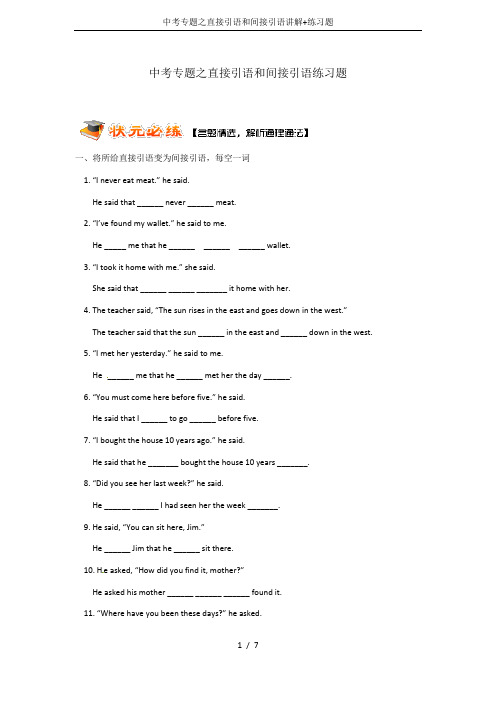
中考专题之直接引语和间接引语练习题一、将所给直接引语变为间接引语,每空一词1. “I never eat meat.” he said.He said that ______ never ______ meat.2. “I’ve found my wallet.” he said to me.He _____ me that he ______ ______ ______ wallet.3. “I took it home with me.” she said.She said that ______ ______ _______ it home with her.4. The teacher said, “The sun rises in the east and goes down in the west.”The teacher said that the sun ______ in the east and ______ down in the west.5. “I met her yesterday.” he said to me.He ______ me that he ______ met her the day ______.6. “You must come here before five.” he said.He said that I ______ to go ______ before five.7. “I bought the house 10 years ago.” he said.He said that he _______ bought the house 10 years _______.8. “Did you see her last week?” he said.He ______ ______ I had seen her the week _______.9. He said, “You can sit here, Jim.”He ______ Jim that he ______ sit there.10. H e asked, “How did you find it, mother?”He asked his mother ______ ______ ______ found it.11. “Where have you been these days?” he asked.He asked me _______ _______ _______been _______ days.12. “Do you know where she lives?” he asked.He asked ______ ______ knew where she ______.13. “Stop making so much noise, children.” he said.He ______ the children ______ ______ making so much noise.14. “Don’t tell him the news.” she said.She told me _______ ______ ______ him the news.15. “Are you interested in this?” he said.He ______ ______ I was interested in ______.答案:1. he, ate2. told, had, found, his3. she, had, taken4. rises, goes5. told, had, before6. had, th ere7. had, before8. asked,if(whether), before9. told, could10. how, she, had11. where, I, had, those12. if(whether), I, lived13. told, to, stop14. not, to, tell15. asked, if(whether), that思路分析:每道题都是考查直接引语变间接引语,需要我们注意的有:①人称,②时态,③状语,④指示代词,⑤句型的变化。
中考英语直接引语和间接引语复习试题(共6页)

直接引语(yǐn yǔ)和间接引语直接引述别人的话,叫“直接引语〞。
用自己的话转述别人的话,叫“间接引语〞。
间接引语在多数情况下构成宾语从句。
直接引语一般前后要加引号,间接引语不用引号。
Eg: He said, "I like English."〔直接〕> He said (that) he likes English.〔间接〕一.直接引语假如是陈述句,变为间接引语时,用连词that 引导〔口语中常略〕,从句中的人称、时态、指示代词、时间是状语、地点状语等要作相应的变化。
1.人称的变化:Eg:(1) Tom asked me, "Can you help me ?">Tom asked me if I could help him.(2) "I'm going to invite my friends to have dinner." Jane told me on the phone.>Jane told me on the phone she was going to invite her friends to have dinner.(3) The teacher said, "John, you must bring your book to the clas s.">The teacher told John that he must bring his book to the cla ss.(4) He said to me, "Can I use your bike?">He asked me if/whether he could use my bike.(5) She asked him, "Would you like to go shopping with me?">She asked him if/whether he would like to go with her.2.时态的变化:假如主句的谓语动词(dòngcí)是一般过去时,直接引语变间接引语时,从句的谓语动词在时态上要作相应的变化。
中考英语直接引语间接引语单选题30题

中考英语直接引语间接引语单选题30题1. He said, “I like reading.” → He said that he ____ reading.A. likeB. likesC. likedD. is liking答案:C。
本题考查直接引语变间接引语时,时态的变化。
原句是一般现在时,变为间接引语时要变为一般过去时,like 变为liked。
A 选项like 时态错误;B 选项likes 是一般现在时的第三人称单数形式,不符合时态变化规则;D 选项is liking 是现在进行时,不符合要求。
2. Mary said, “I am doing my homework.” → Mary said that she ____ her homework.A. was doingB. is doingC. doesD. did答案:A。
原句是现在进行时,变为间接引语时,时态变为过去进行时。
B 选项is doing 是现在进行时,时态错误;C 选项does 是一般现在时,时态不对;D 选项did 是一般过去时,不符合过去进行时的要求。
3. They said, “We have a party every month.” → They said that they____ a party every month.A. haveB. hadC. hasD. having答案:B。
直接引语是一般现在时,变为间接引语要变为一般过去时,have 变为had。
A 选项have 时态错误;C 选项has 是第三人称单数形式,不符合;D 选项having 不是谓语动词形式,不能单独作谓语。
4. The girl said, “You are very kind.” → The girl said that I ____ very kind.A. amB. wasC. wereD. be答案:B。
人称要根据主句的主语变化,主句主语是the girl,从句中的you 要变为I,时态从一般现在时变为一般过去时,am 变为was。
中考英语专题复习:直接引语和间接引语试题
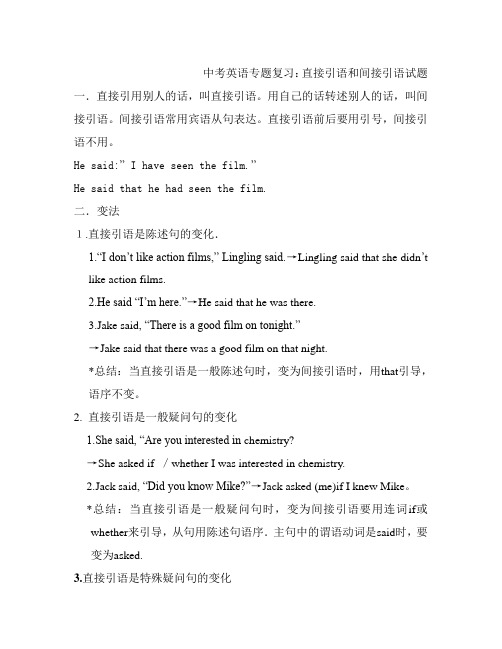
中考英语专题复习:直接引语和间接引语试题一.直接引用别人的话,叫直接引语。
用自己的话转述别人的话,叫间接引语。
间接引语常用宾语从句表达。
直接引语前后要用引号,间接引语不用。
He said:” I have seen the film.”He said that he had seen the film.二.变法1.直接引语是陈述句的变化.1.“I don’t like action films,” Lingling said.→Lingling said that she didn’tlike action films.2.He said “I’m here.”→He said that he was there.3.Jake said, “There is a good film on tonight.”→Jake said that there was a good film on that night.*总结:当直接引语是一般陈述句时,变为间接引语时,用that引导,语序不变。
2. 直接引语是一般疑问句的变化1.She said, “Are you interested in chemistry?→She asked if /whether I was interested in chemistry.2.Jack said, “Did you know Mike?”→Jack asked (me)if I knew Mike。
*总结:当直接引语是一般疑问句时,变为间接引语要用连词if或whether来引导,从句用陈述句语序.主句中的谓语动词是said时,要变为asked.3.直接引语是特殊疑问句的变化1.He asked me, “What are these?”→He asked me what those were.2.Betty asked me “Where are you from?”→Betty asked me where I was from.*总结:当直接引语是特殊疑问句时,变为间接引语时,要用原来的疑问词引导,,从句用陈述句语序.4.直接引语是祈使句的变化1.He said to the children, “Be quiet,”→He told the children to be quiet2.He said to Betty“ Sto p.”→He asked Betty to stop.3.She said to Tony,“Don’t go close to the bears.” →She told Tony not to go close to the bears*总结:当直接引语是祈使句时,变为间接引语时,一般转换为tell sb to do sth或.ask sb to do sth.*注意事项1.如果直接引语中的主语为第一人称1、人称随主语做适当变化变为间接引语时,人称要随句子的人称而变化。
中考英语直接引语和间接引语专题指导练习
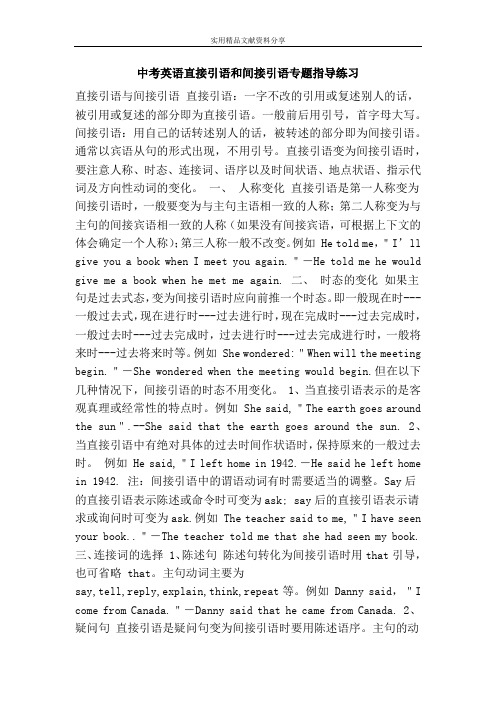
中考英语直接引语和间接引语专题指导练习直接引语与间接引语直接引语:一字不改的引用或复述别人的话,被引用或复述的部分即为直接引语。
一般前后用引号,首字母大写。
间接引语:用自己的话转述别人的话,被转述的部分即为间接引语。
通常以宾语从句的形式出现,不用引号。
直接引语变为间接引语时,要注意人称、时态、连接词、语序以及时间状语、地点状语、指示代词及方向性动词的变化。
一、人称变化直接引语是第一人称变为间接引语时,一般要变为与主句主语相一致的人称;第二人称变为与主句的间接宾语相一致的人称(如果没有间接宾语,可根据上下文的体会确定一个人称);第三人称一般不改变。
例如 He told me,"I’ll give you a book when I meet you again."―He told me he would give me a book when he met me again. 二、时态的变化如果主句是过去式态,变为间接引语时应向前推一个时态。
即一般现在时---一般过去式,现在进行时---过去进行时,现在完成时---过去完成时,一般过去时---过去完成时,过去进行时---过去完成进行时,一般将来时---过去将来时等。
例如 She wondered:"When will the meeting begin."―She wondered when the meeting would begin.但在以下几种情况下,间接引语的时态不用变化。
1、当直接引语表示的是客观真理或经常性的特点时。
例如 She said,"The earth goes around the sun".--She said that the earth goes around the sun. 2、当直接引语中有绝对具体的过去时间作状语时,保持原来的一般过去时。
例如 He said,"I left home in 1942.―He said he left home in 1942. 注:间接引语中的谓语动词有时需要适当的调整。
初中英语直接引语和间接引语(含练习题和答案)

直接引语和间接引语Direct Speech and Indirect Speech直接引述别人的原话,叫直接引语。
用自己的话转述别人的话,叫间接引语。
间接引语在多数情况下构成宾语从句。
直接引语一般前后要加引号;间接引语不用引号。
例如:直接引语:Mr. Black said, “I’m busy.”间接引语:Mr. Black said that he was busy.1.陈述句直接引语如果是陈述句,变为间接引语时,用连词that引导(that在口语中常省略),从句中的人称、时态、指示代词、时间状语、地点状语等要作相应的变化。
(1)人称的变化• He said, “I like it very much.”→ He said that he liked it very much.• He said, “I’ve left my book in your room.”→ He told me that he had left his book in my room.(2)时态的变化如主句的谓语动词是一般过去时,直接引语变间接引语时,从句的谓语动词在时态方面要作以下的变化:• He said, “I saw the film yesterday.”→ He said that he had seen the film the day• She said, “I have seen the film. It is good. ”→ She said that she had seen the film.直接引语如果是客观真理,变为间接引语时,时态不变。
例如:• He said, “Light travels much faster than sound.”→ He said that light travels much faster than sound.(3)指示代词、时间状语和地点状语的变化• She said, “I will come this evening.”→ She said that she would go that evening.• He said, “My sister was here three days ago, but she is not here now.”→ He said that his sister had been there three days before but she was not here then.现将这几种变化列表如下:以上这些变化,要根据说话的实际情况来定。
直接引语和间接引语讲解和练习(答案)

直接引语和间接引语直接引述别人的原话,叫做直接引语;用自己话转述别人的话,叫做间接引语。
间接引语一般构成宾语从句。
直接引语必须放在引号内,间接引语则不用引号。
直接引语改为间接引语时,除将引语部分变成宾语从句外,还必须对直接引语中的人称、时态、指示代词、时间状语、地点状语等进行改变。
直接引语转成间接引语的时态变化:1、当主句谓语动词是一般现在时态或一般将来时态宾语从句的谓语动词的时态不作任何变化。
如:He said, ”We help each other. ” = He said that they help each other.She said, ” I have bought a dictionary. ” = She said that she had bought a dictionar y.She said, ” He will go to the hospital. ” = She said that he would go to the hospital.注意:主句谓语动词是一般过去时态动词表示客观真理仍用一般现在时态,不必变为过去时态。
如:The teacher said, “Light travels much faster than sound.”= The teacher said light travels much faster than sound.2.在人称方面存在人称的变化,变化规律常常是:(1)直接引语中的第一人称常跟主句的主语一致。
e.g.He said,“I have finished my homework.”→He said(that)he had finished his homework.(2)直接引语中的第二人称常常依主句中位于动词后面的谈话对象而定,若后面没有谈话对象,则常变为第一人称。
e.g.Tom said,“You must finish your homework today.”→Tom said I had to finish my homework that day.(3)直接引语中的第三人称变为间接引语时, 常不变。
(完整版)初中英语专项练习:直接引语和间接引语
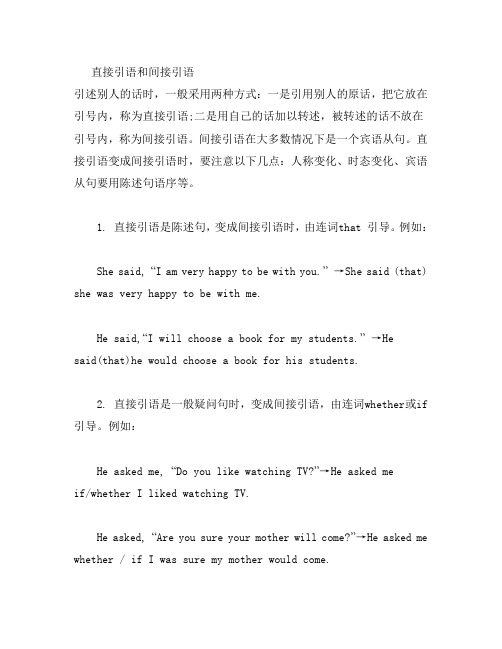
直接引语和间接引语引述别人的话时,一般采用两种方式:一是引用别人的原话,把它放在引号内,称为直接引语;二是用自己的话加以转述,被转述的话不放在引号内,称为间接引语。
间接引语在大多数情况下是一个宾语从句。
直接引语变成间接引语时,要注意以下几点:人称变化、时态变化、宾语从句要用陈述句语序等。
1. 直接引语是陈述句,变成间接引语时,由连词that 引导。
例如:She said, “I am very happy to be with you.”→She said (that) she was very happy to be with me.He said,“I will choose a book for my students.”→Hesaid(that)he would choose a book for his students.2. 直接引语是一般疑问句时,变成间接引语,由连词whether或if 引导。
例如:He asked me, “Do you like watching TV?”→He asked meif/whether I liked watching TV.He asked, “Are you sure your mother will come?”→He asked me whether / if I was sure my mother would come.注意:大多数情况下, if和whether 在引导宾语从句时可以互换,但后紧跟or not时,一般只用whether。
例如:She asked me whether or not he could do the work. / She asked me whether he could do the work or not.3. 直接引语是特殊疑问句,变成间接引语时,由相应的连接词who, whom, what, whose, how, when, why, where 等引导。
2010届中考英语第二轮语法复习—间接引语

第十六章间接引语我们平时总会遇到转述他人谈话的时候,这时就需要使用间接引语来完成任务了。
一、直接引语直接引语就是直接引用别人的原话,并在原话前后加引号;间接引语就是用自己的话转述别人的话,多数以宾语从句的形式构成,不加引号而多用连词that引导宾语从句。
直接引语变为间接引语需要有人称和物主代词的变化、时态的变化、指示代词的变化以及时间和地点状语的变化。
1人称的变化主语为第一人称时,转变为间接引语之后,人称要作相应的调整。
例如:She said:“I am tired.”她说:“我累了。
”She said that she was tired.她说她累了。
The headmaster said to us:“You must study hard now.”校长说:“你们现在一定要努力学习。
”The headmaster told us that we had to study hard then.校长告诉我们,我们那时必须努力学习。
2 时态的变化直接引语变为间接引语时,间接引语的时态要与主句的时态一致。
其规律一般是:直接引语间接引语一般现在时一般过去时一般过去时过去完成时一般将来时过去将来时现在进行时过去进行时现在完成时过去完成时过去完成时不变将来进行时过去将来进行时将来完成时过去将来完成时She said:“I am your mother's friend.”她说:“我是你妈妈的朋友。
”→She said that she was my mother's friend.她说她是我妈妈的朋友。
(一般现在时变为一般过去时)Susan said to her mother:“I am reading this book.”苏姗对她妈妈说:“我正在看这本书。
”→Susan told her mother that she was reading that book.苏姗告诉她母亲她正在看那本书。
直接引语和间接引语讲解及练习

直接引语和间接引语讲解及练习Unit1语法核心突破:直接引语变间接引语定义:我们转述别人的话时,可以引用别人的原话,被引用的部分称为直接引语;用自己的话转述别人的话叫间接引语。
这两种引语都是宾语从句,但是直接引语放在引号内,不用连词联接;间接引语不用引号,通常用连接词与主句联接一、直接引语变间接引语时句式的变化1.陈述句变为以that引导的宾语从句例:He said。
“I'm very glad.”XXX.2.一般疑问句变为if (whether)引导的宾语从句。
例:He said。
“Can you come this afternoon。
John?”XXX.3.特殊疑问句变为由who。
what。
when,why。
where等特殊疑问词引导的宾语从句例:He said。
“Where is Mr。
Wang?”He asked where Mr。
Wang was.Tom says to me,“what fooddo you like best”.XXX asks mefood I like XXX4.祈使句变间接引语时,要变成ask/ tell/order sb(not)to do sth。
Our parents told us“Learn English well!”我们的怙恃通知我们:“把英语学好啊!”Our XXX well.我们的父母告诉我吗要把英语学好。
XXX said to me,“Don’t read that novel!”XXX.Our parents told us。
“ Never do wrong!”父母告诉我们:“不要做错事!”XXX us never to do wrong.我们的父母告诉我们不要做错事。
12、人称的变革点拨】人称的变化一般遵循“一同主,二随宾,三不变”这一原则例如:“Iwent to the Great Wall XXX,”Li Huasaid.Li Hua said thathehad gone to the Great Wall the daybefore.I’ll XXX,” XXX.XXX help.She said tome,“n is better than his.”XXX his.三、时态变化主句的谓语动词是普通曩昔时,从句的谓语动词在时态方面要做响应的变革,总的准绳是向曩昔推一个时态时态的变革一般现在时→普通曩昔时现在进行时→过去进行时普通未来时→曩昔未来时例句She said。
中考初中英语直接引语间接引语专讲与专练
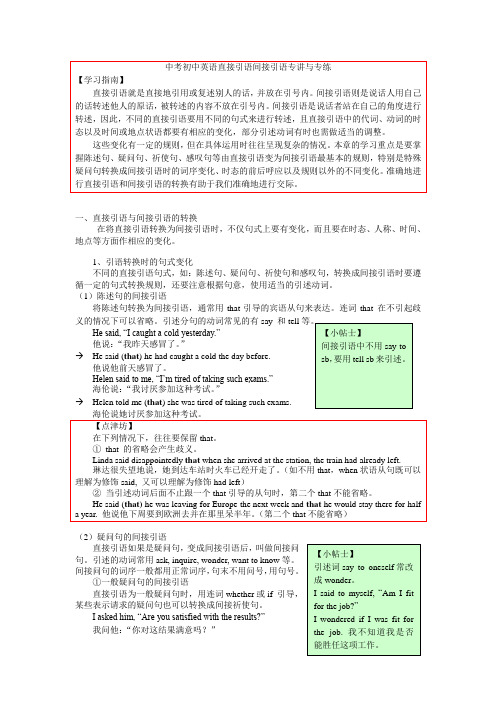
一、直接引语与间接引语的转换在将直接引语转换为间接引语时,不仅句式上要有变化,而且要在时态、人称、时间、地点等方面作相应的变化。
1、引语转换时的句式变化不同的直接引语句式,如:陈述句、疑问句、祈使句和感叹句,转换成间接引语时要遵循一定的句式转换规则,还要注意根据句意,使用适当的引述动词。
(1)陈述句的间接引语将陈述句转换为间接引语,通常用that 引导的宾语从句来表达。
连词that 在不引起歧义的情况下可以省略。
引述分句的动词常见的有say 和tellHe said, “I caught a cold yesterday.” 他说:“我昨天感冒了。
” →He said (that ) he had caught a cold the day before. 他说他前天感冒了。
Helen said to me, “I’m tired of taking such exams.”海伦说:“我讨厌参加这种考试。
”→ Helen told me (that ) she was tired of taking such exams.(2)疑问句的间接引语直接引语如果是疑问句,变成间接引语后,叫做间接问句。
引述的动词常用ask, inquire, wonder, want to know 等。
间接问句的词序一般都用正常词序,句末不用问号,用句号。
①一般疑问句的间接引语直接引语为一般疑问句时,用连词whether 或if 引导,某些表示请求的疑问句也可以转换成间接祈使句。
I asked him, “Are you satisfied with the results?” 我问他:“你对这结果满意吗?”→I asked him whether he was satisfied with the results.我问他对这结果是否满意。
“Did you go to the British Museum yesterday?” asked Kate.凯特问:“你昨天有没有去大英博物馆?”Kate asked me if I had gone to the British Museum the day before.→凯特问我昨天有没有去大英博物馆。
中考英语 直接引语与间接引语用法总结与练习试题

介父从州今凶分市天水学校初中直接引语与间接引语用法总结与练习〔〕引述别人的话有两种方式:一是使用引号引出别人的原话,这叫做直接引语;一是用自己的话把别人的话转述出来,这叫做间接引语。
例如:John said, "I'm going to London with my father."John said that he was going to London with his father.由直接引语变为间接引语,分以下情况:1.直接引语是陈述句时间接引语为that引导的宾语从句,主句的引述动词主要有say ,tell, repeat, explain, think等。
He said, "You are younger than I."-'He said (that) I was younger than him.2. 直接引语是疑问句时变成间接引语时,间接引语用陈述语序:主句的谓语动词say 改为ask,或改为wonder, do not know, want to know, be not sure, be puzzled等。
假设主句的谓语动词本身就为ask,那么变为间接引语时ask不必再变化。
〔1〕一般疑问句变为if (whether)引导的宾语从句。
She said, "Do you often come here to read newspapers?"→She asked me if (或whether)I often went there to read newspapers.She asked me , "You have seen the film, haven't you?"→She asked me whether(或if )I had seen the film.〔2〕选择疑问句变为whether….or 宾语从句。
直接引语和间接引语详解与习题
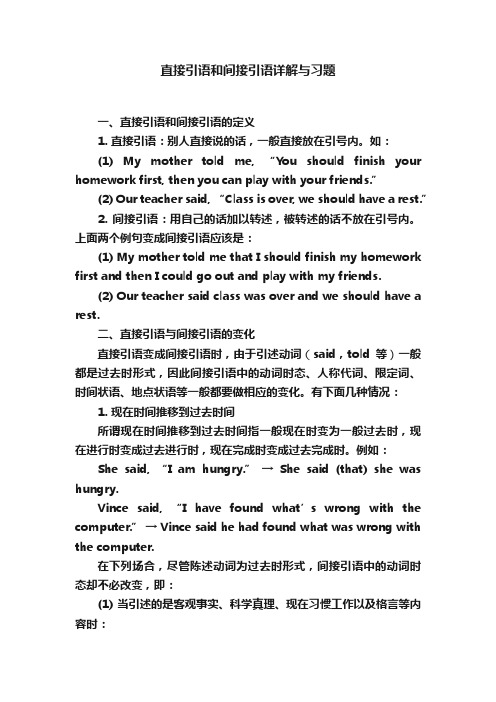
直接引语和间接引语详解与习题一、直接引语和间接引语的定义1. 直接引语:别人直接说的话,一般直接放在引号内。
如:(1) My mother told me, “You should finish your homework first, then you can play with your friends.”(2) Our teacher said, “Class is over, we should have a rest.”2. 间接引语:用自己的话加以转述,被转述的话不放在引号内。
上面两个例句变成间接引语应该是:(1) My mother told me that I should finish my homework first and then I could go out and play with my friends.(2) Our teacher said class was over and we should have a rest.二、直接引语与间接引语的变化直接引语变成间接引语时,由于引述动词(said,told等)一般都是过去时形式,因此间接引语中的动词时态、人称代词、限定词、时间状语、地点状语等一般都要做相应的变化。
有下面几种情况:1. 现在时间推移到过去时间所谓现在时间推移到过去时间指一般现在时变为一般过去时,现在进行时变成过去进行时,现在完成时变成过去完成时。
例如:She said, “I am hungry.” → She said (that) she was hungry.Vince said, “I have found what’s wrong with the computer.” → Vince said he had found what was wrong with the computer.在下列场合,尽管陈述动词为过去时形式,间接引语中的动词时态却不必改变,即:(1) 当引述的是客观事实、科学真理、现在习惯工作以及格言等内容时:He said, “The word ‘laser’ is an acronym(首字母缩略词).” → He said the word ‘laser’ is an acronym.(2) 当动词所表示的状态或动作在引述时仍在继续时:“I’m forty,” he said. → He said he is forty.(3) 当谓语动词包含无过去时形式的情态助动词时:He said, “It must be pretty late. I really must go.” → He said it must be pretty late, and he really must go.He said, “You mustn’t smoke in the room.”→ He said I mustn’t smoke in the room.2. 过去时间推移到过去的过去这里需要注意以下几点:(1) 当强调动作或状态先于引述动词时,一般过去时要变成过去完成体。
- 1、下载文档前请自行甄别文档内容的完整性,平台不提供额外的编辑、内容补充、找答案等附加服务。
- 2、"仅部分预览"的文档,不可在线预览部分如存在完整性等问题,可反馈申请退款(可完整预览的文档不适用该条件!)。
- 3、如文档侵犯您的权益,请联系客服反馈,我们会尽快为您处理(人工客服工作时间:9:00-18:30)。
初中英语——直接引语与间接引语
直接引语转化为间接引语:三变:一变人陈二变时态三变状语四变句型
直接引语变间接引语,状语变化有其内在规津,时间状语由“现在”改为“原来”(例:now变为, yesterday变为today 变为; tomorrow 变为地点状语,尤其表示方向性的,或用指示代词修饰的状语,由“此”改为“彼”:指示代词中this要改为; these 要改为 .; here变为; 动词come变为;
注yesterday 变成the day before ,时态要由原来的一般过去时变为过去完成时
四、如何变句型:
①直接引语如果是陈述句,间接引语应改为由that引导的宾语从句。
如:She said, "Our bus will arrive in five minutes."→She said that their bus would arrive in five minutes.
②直接引语如果是反意疑问句,选择疑问句或一般疑问句,间接引语应改为由whether或if引导的宾语从句.如:He said, "Can you swim, John?" →He asked John if he could swim.
"You have finished the homework, haven…t you?" my mother asked. →My mother asked me whether I had finished the homework.
"D o you go to school by bus or by bike?" →He asked me if I went to school by bus or by bike.
③直接引语如果是特殊问句,间接引语应该改为由疑问代词或疑问副词引导的宾语从句(宾语从句必须用陈述句语序)。
She asked me, "When do they have their dinner?"→ She asked me when they had their dinner.
④直接引语如果是祈使句,间接引语应改为"tell(ask, order, beg等) sb (not) to do sth."句型。
如:
"Don‟t make any noise," she said to the children. →She told (ordered) the children not to make any noise. "Bring me a cup of tea, please," said she.→She asked him to bring her a cup of tea.
⑤直接引语如果是以“Let…s”开头的祈使句,变为间接引语时,通常用“suggest +动句词(或从句)。
”如:
He said, "Let‟s go to the film." →He suggested going to the film.或He suggested that they should go to see the film.
1 He said , “Mother, the boy is very naughty.”
2 He said to me, “I have left my book in your room.”
3 She said, “I will come here again tonight.”
4 He said, “I arrived yesterday morning.”
5She said , “My sister will be back tomorrow morning.”6Paul said, “I‟m trying to get a taxi.”
7 “I never eat meat.” He explained.
8 “Have you been here for ages?” she said.
9 He asked, “Are you sure your mother will come?‟
10 He asked, “Are you a teacher or a student?”
11 He said to me, “Please come again tomorrow.”
12 He said to me, “Don‟t do that again.”
13 He said, “Where is she going?”
14 “Who lives next door?” she asked.
15 “What‟s happened?” he asked.
16 “Mary, when is the next train?” he asked.
17 “Why did you stop the car, Tom? ” she asked.
27 “Shall I wait for them or shall I go on?” the man asked.
28 “Shall I lock the car or leave it unlocked?” she asked.
29 “Will you be here tomorrow?” he asked me.
30 “Would you like to come in for a drink?” she asked Bill.
35 “Do sit down, everybody.” said the hostess.
巩固练习:
1. She asked him ____.
A. whose dictionary this is
B. whose dictionary that was
C. whose dictionary is this
D. whose dictionary that is
2. Mary‟s mother asked her _____.
A. that whether she had finished her homework
B. if she has finished her homework
C. if she had finished her homework
D. that if she had finished her homework
3. He asked me ____.
A. how would the weather be like tomorrow
B. what the weather would be like the next day
C. how the weather would be like tomorrow
D. what would the weather be like the next day
4. She told me that she ____ by her relatives at the bus stop.
A. had been seen off
B. have seen off
C. have been seen off
D. had seen off
5. Can you guess ____?
A. what is that man
B. who that man is
C. whom that man is
D. who is that man
6. The hostess said that it ___ time that they ___ supper.
A. was; had
B. was; had had
C. is; have
D. is; have had
7. The boss asked his secretary ____ he had finished typing the report ____.
A. if; or not
B. if; not
C. whether; or not
D. whether; not。
